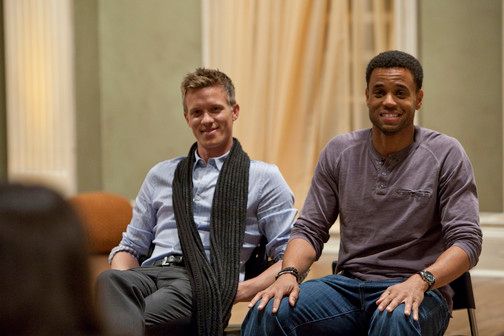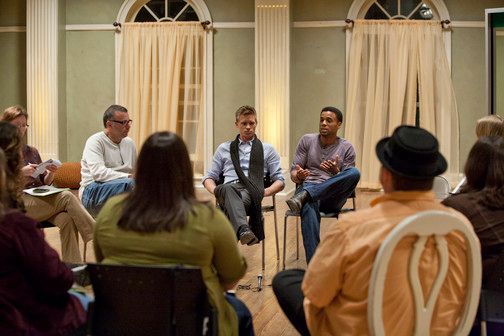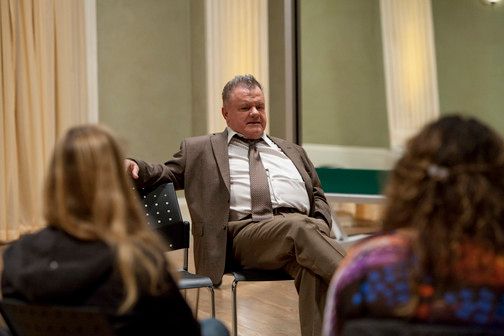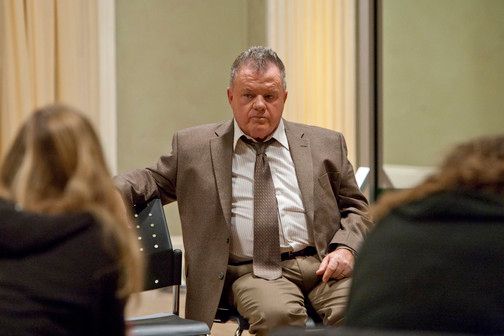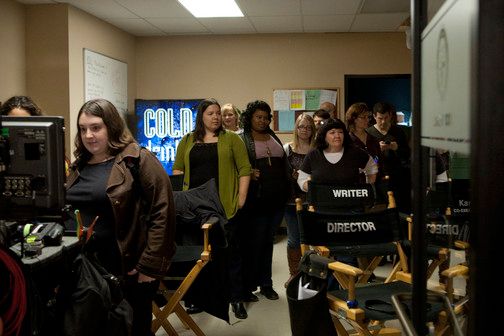Back in December, I was invited to visit the New Orleans set, when the network was initially slated to premiere the show in late January. However, shortly after our trip to the set (one week after, to be exact), the network pushed the premiere to summer, due to the incredibly positive feedback the network was getting from, "focus groups and others who have seen" the pilot episode. I was among the "others" who watched the pilot, and I must say it was fantastic, fitting in perfectly with USA's current crop of shows, while giving the cop genre a "blue skies" twist.
The show centers on Travis Marks (Michael Ealy) and Wes Mitchell (Warren Kole), two L.A.P.D. detectives who are great at their jobs... when they're not at each other's throats. Their boss, Captain Sutton (Jack McGee), has had enough of their constant bickering and takes a unique step to ensure a more peaceful workplace: he sends them to couple's counseling to save their "work marriage." The pilot starts out at their first counseling session lead by the lovely Dr. Ryan (Sonya Walger) and a number of other couples. Travis is obviously a good-natured charmer, while Wes is sardonic, overly critical, and borderline obsessive-compulsive. But, when push comes to shove, they're the best in the whole precinct.
The night before visiting the set, our press group gathered at a New Orleans restaurant to watch the pilot, and we were also graced with the presence of Sonya Walger, who plays Travis and Wes' therapist, Dr. Ryan. Essentially, Captain Sutton forces his two top cops to attend these sessions, because Dr. Ryan helped save the Captain's own marriage, and thinks she can do some good for these two. While the actress has appeared in two different series revolving around therapy (In Treatment and Coupling), she has never played a therapist.
"I've done two therapy shows, I'm always on the other side of the couch. It's really fun to be the one that doesn't have the problem. It's really fun to not be the one with the problem. It's really fun. And it's fun as an actor just to get to listen honestly. You usually are so busy driving the scene and having all these heavy emotions and sobbing down phones and talking about tears in the space time continuum. It's so fun just to sit there and be like oh you've got the issue, you talk about it. It's a real pleasure, it's a real relief to have that actually."
Executive producer Karim Zreik also joined us for dinner that night, and he teased a few details about the episode they were shooting that day, which was called The Ex Factor at the time, but it now bears the title Exes.
"We started episode 106 today. It's called The Ex Factor. It's when, uh, Travis' former partner shows up and he's now Beverly Hills PD and he comes in with his, what we call the Travis 2.0. So it's the new Travis. Now Travis' old partner and his partner have to work with Travis and Wes on a case. And it's the dynamics of having to work with your ex, boyfriend, girlfriend, whatever it is."
Michael Ealy and Warren Kole - Travis Marks and Wes Mitchell
Sonya Walger was saying you're having a lot of fun.
Michael Ealy: Definitely. I mean I think we definitely try to keep the energy off camera similar to the energy that's on camera. Today we were about to do a scene right now where I was like Warren, what do you think about... like we got to pencil fight in between takes. Our producer doesn't know. So we try to incorporate that into the scene like we're going to try and bring that into the scene because it's something that we, we do and it's something Travis and Wes do so that's, that's the kind of thing that we, you know, we can't help it we spend every day together, every day.
Warren Kole: I'm very thankful that I'm working with an actor like Michael he's easy to work with every day so we don't end up killing each other.
How would you compare it to detective pairings in the past?
Michael Ealy: I think this whole process has felt completely unique because of the therapy component of the show. When you get into therapy and you start talking about how we make each other feel and stuff like that, I've just never seen that before and I think you know, yes we are a buddy cop show. That's a component as you can tell, it's a buddy cop show. That's because we're buddies and we're cops but the minute we get into therapy I think we're going into unchartered waters in terms of the buddy cop dynamic.
Warren Kole: It's like sibling relationship in that way because there's a feeling of you've been so together with someone for so long and they don't appreciate what you do and it's their fault that they don't appreciate what you're doing for them and if you'd just respect me and recognize you know how much I do for you then maybe I would swallow my pride and say the same thing back but we never really get there, yet. Haven't got there yet.
Have you learned anything personally from the therapy?
Michael Ealy: You know one of the things we say in, in the pilot or Dr. Ryan says in the pilot is you don't have to like the same things, you just have to hate the same things. And I find that that's actually quite true you know in any kind of relationship. If it's me and my sister, we both hate vampire movies. I think what we are learning as detectives is you know there is some, there's a need to compromise at times but when we do, we both hate crime we both, you know get off on trying to ah, to try and get the bad guy and I think you see us get along in certain moments and then you see us not get along in certain moments but when we don't get along it usually has nothing to do with the crime, right? It's, it's something personal you know my messiness or his tightassness.
Do you think in the future they won't be made fun of for going to therapy?
Michael Ealy: You almost feel like if we didn't argue we wouldn't be able to solve the crime. Like we almost have to do it in order to be able to be good at what we do. The minute we start to get along all the time, we don't need to be partners anymore. I think the good thing is that everybody in the precinct knows that we didn't sign up. We weren't like oh, let's go to couples therapy it wasn't like I came to him and said let's do this, we were forced to go and, and Warren has the, the privilege of saying that repeatedly to, to, to Jack the captain and like, you forced us to go, no, no this wasn't our choice.
Will the show ever get heavy? Like dealing with the ex-wife.
Warren Kole: It seems the world on this is one that sort of perpetuates fast when it is a little lighter and there's levity there to keep it moving and keep it interesting. We have our moments when we dip into something a little more serious but it's just, it hasn't really been the definition of the show so far.
The therapy is light.
Michael Ealy: We're still quite entertaining in the therapy but I think, there are some moments that, that bring a little bit of gravitas to the show we, we have to do that in order to be incredible as, as detectives, as human beings as people with feelings. I mean if you don't really believe that he really misses his ex-wife you don't buy into it you know what I mean? Why spend time invested in that storyline you know what I mean? You have to believe that and obviously Travis has his demons from his past and you know all that stuff kind of, it kind of manifests itself, we just don't do it a lot because that's just not the, you know we don't want to, we're not that show.
Can you elaborate about what demons come out in therapy?
Warren Kole: I touched on it earlier, the mistakes I made ah getting obsessed with excellence and competition and losing my moral compass a little bit ah as a competitor and a lawyer and where he's willing to sacrifice that whole life and adopt a new kind of identity as something that can a direct effect on things being a police officer, being a cop. Mine was shaped by a singular event, singular tragedy. Travis is a little different. Wes' every moment is kind of redemption.
Michael Ealy: Travis, his are a bit more submerged and I think they stem from childhood which I think are much deeper and more difficult um treasure chest of demons to get into, it really is and I think it's going to take him a little bit longer to kind of, to kind of open up.
Travis has a nurturing nature.
And you're not?
Michael Ealy: Me, I'm much more guarded, I'm much more guarded. Travis is that, this has been so much fun to play because he is just so social and you know he wants to be light he wants everybody to like him whereby I could give a shit.
Will we see his siblings?
Michael Ealy: Yeah, yeah.
Warren Kole: He's got dozens of them.
He's got family all over town?
Michael Ealy: I got a lot of moms. It's weird but again, it's fun and it's actually kind of beautiful you know I mean there is no real limit to what we can do with this character and, in terms of his familial contacts and even just friends from the past. In this episode right now we're dealing, can I say that, what we're doing? Okay we're dealing with his former partner and how Wes and Travis actually meet and we're learning as we go along you know about these guys as well, so it's been, it's been fun.
Is it hard to fight on the show when you're friends?
Warren Kole: I think it's healthy because if there is like, you can get a little frustrated with the day or whatever it's always nice to be able to let it out and work the problems out on camera and have a fight or this or that. It doesn't seem to get tiring because it's just a flow. It's not necessarily because I hate you if I blowout all the time it's just like, difference it's, it's yeah I can, will you just stop being here please all the time, breathing.
Michael Ealy: Stop breathing. I mean and we tend to like, we tend to have each other's backs as, as actors in terms of you know there's a day like yesterday I was a bit incoherent most of the day it was just like, yo man, hold it down today, you know what I mean? And, and you know he's done the same thing you know it's like thanks for being, thanks for making that scene work because I had no recollection of what just happened and that is you know it's just the schedule is rough and we got to kind of have each other's back but we always try to make the scenes you know as Wes and Travis as possible and the more episodes we do, the more we actually understand these characters and the more input you have.
Warren Kole: Yeah it's like making a friend and then learning the subtleties of that friend and once you get to know the broad, you know faith and trust their personality you can kind of work on the little idiosyncrasies and that's fun, to dive that deep.
Warren Kole: I had a lot of resources with cop work and that's, that helps I read some Oliver Wendell Holmes or something just to get an idea of like the walk and it's more, it's such a relationship show it's more about the psychology not necessarily the you know, how this guy does his cop work and procedure but kind of first, why is he the way he is today? And it's because he's gay or to protect him like anybody else. Why, why is he difficult? It's easier you know, that's the way that he's found, he's built up the walls enough that's how he's found a way to operate in the world and still kind of keep his pride in check.
Michael Ealy: Natural prickness.
Warren Kole: Natural pricking.
We also got to sit down with the fantastic Jack McGee, who is rather hilarious in person. He spoke about how his Captain Sutton is constantly defending the antics of Travis and Wes, because, ultimately, they get the job done.
"Well that's the deal, he has to defend him because they keep screwing up. They're good cops but they don't know how to deal with each other, they don't know how to talk to each other. It's about relationships, you guys are in relationships aren't you? A lot of people would rather be right and alone. You know I know what that was like, I know what that's like. You know sometimes I'll say to my wife, 'Honey, what can I do today for you that can make your day better?' And sometimes she says to me, 'You can stay out of it.' I know where it's coming from we laugh. I've seen them evolve now that there's a rigidity to Warren Kole's character and there's been great glimpses, I haven't seen the pilot as it's been restructured but there's been great moments where you just see in Warren that he knows his rigidity is costing him his relationship with his marriage. He just doesn't know what to do with it so he's a guy who will not, willingly go in for help to see if he can make that happen."
That about wraps it up from my day on the set of Common Law, which airs the 90-minute series premiere Friday, May 11 at 9 PM ET. As a longtime fan of Michael Ealy, and a new fan of Warren Kole, I'm very excited to see how this show progresses after the fantastic pilot. If you're a fan of any other show on the USA lineup, you will surely love Common Law for its fresh and humorous spin on the buddy cop genre, with great performances across the board.

